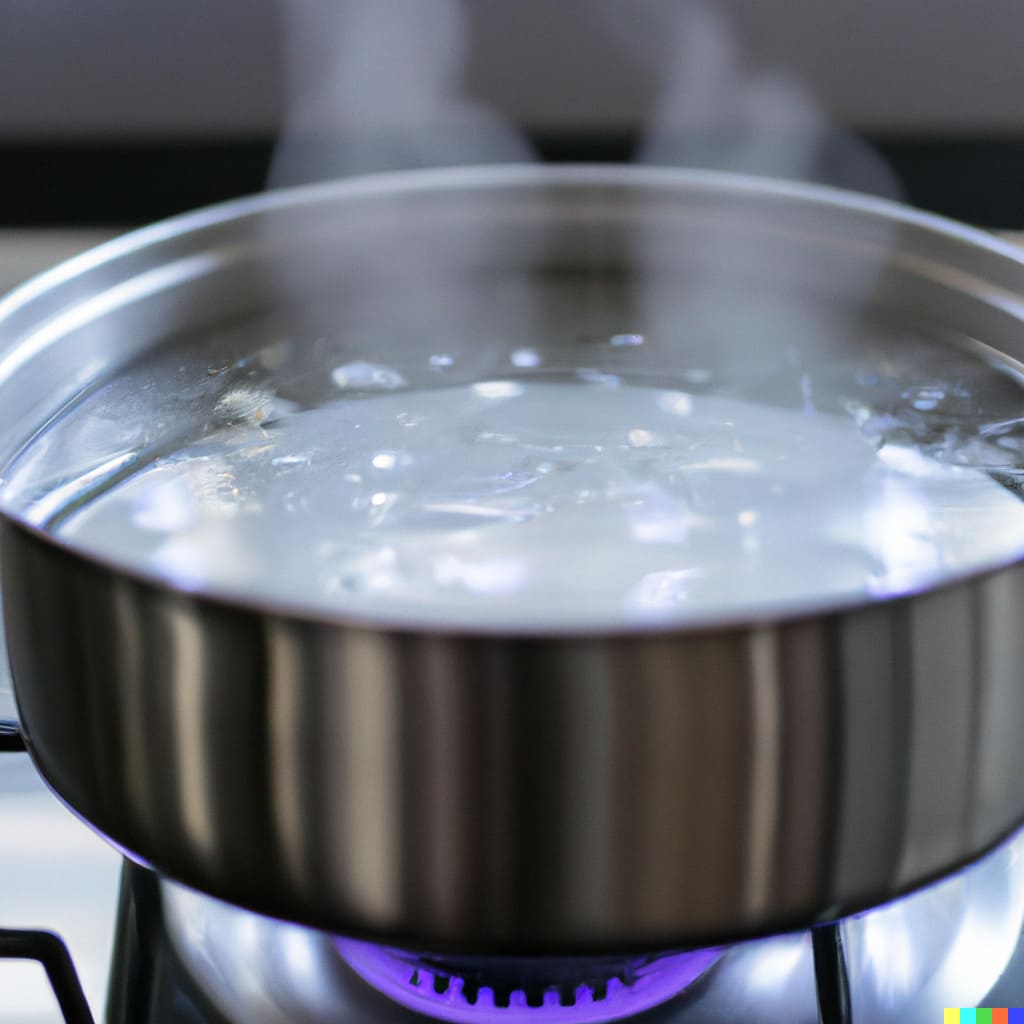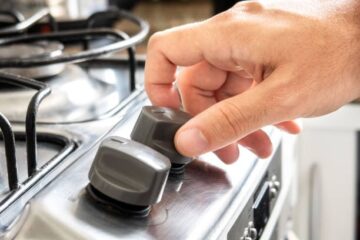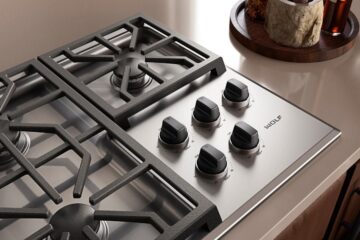If you have an electric stove and find it takes forever to boil water, you are certainly not alone. Many of us have experienced the frustration of waiting for an electric stove to heat up and finally produce a boiling pot of water. This blog post will explore why electric stoves take so long to boil water and what you can do about it. By the end, you’ll better understand why your electric stove takes forever to boil water.
How Do Electric Stoves Work?
Electric stoves work by converting electrical energy into heat energy. The stove has heating elements, typically made of metal, located at the bottom. These heating elements are connected to an electrical circuit that runs through the stove. When you turn on the stove, electricity flows through the heating elements, causing them to heat up. This heat is then transferred to the pots and pans on the stovetop, cooking the food.
What Temperature Is Simmer On An Electric Stove?
Simmer on an electric stove is typically between 185°F to 205°F. This low to medium heat setting is used for cooking food at a gentle simmer. This temperature range is ideal for cooking delicate dishes such as sauces, soups, and stews and keeping food warm without burning it. It’s important to note that different recipes may call for slightly different simmer temperatures. Hence, it’s always best to check the recipe for specific instructions.
How Hot Do Electric Stoves Get?
Electric stoves can get very hot, depending on the temperature setting used. The highest heat setting on an electric stove can reach temperatures up to 600°F or more. This heat setting is typically used for boiling water or high-heat cooking tasks such as searing or stir-frying.
The medium heat setting on an electric stove typically ranges between 375°F to 425°F, which is suitable for most cooking tasks such as sautéing, frying, and baking.
The low heat setting on an electric stove typically ranges between 200°F to 250°F, which is suitable for simmering, warming, and keeping food warm.
It’s important to note that the same temperature range of an electric stove can vary depending on the brand and model, so it’s always best to consult the manufacturer’s instructions for specific temperature ranges.
Does It Take Longer To Boil Water On An Electric Stove?
It can take longer to boil water on an electric stove than on a gas stove because it takes longer to heat up and may not retain heat. However, the specific time it takes to boil water on an electric stove can vary depending on factors such as the size of the pot, the amount of water, and the specific model of the stove.
Electric Stove Takes Forever To Boil Water
There are a few possible reasons why your electric stove takes forever to boil water:
The burner size
The burner you are using may need to be more significant to accommodate the size of the pot or kettle you are using. Make sure to match the size of the burner to the size of the pot or kettle for optimal heating.
The burner temperature
The burner’s temperature may need to be higher to heat the water effectively. Adjust the burner to the highest setting and monitor the water temperature.
The pot or kettle material
The material of the pot or kettle may not be suitable for heating on an electric stove. Stainless steel or aluminum pots and kettles heat faster than those made of copper or cast iron.
The pot or kettle lid
Leaving the lid off the pot or kettle can slow down the boiling process as heat escapes. Keep the lid on to trap heat and speed up the boiling process.
The amount of water
If you are trying to boil a large amount, it will take longer than if you were boiling a small amount. Be patient and monitor the water temperature.
The stove’s heating element
If your stove is old, the heating element may need to be fixed as efficiently as it should. If this is the case, it is time to consider replacing the stove.
What Do You Need To Do If Your Electric Stove Takes Forever To Boil Water?
If your electric stove is taking a long time to boil water, there are several things you can try to fix the problem:
Check the burner
Make sure the burner is clean and free of debris. If it is dirty, clean it with a stove brush or scraper.
Check the pot or kettle
Make sure the pot or kettle you are using is manageable for the burner. A pot that is too large can impede the heat from reaching the water.
Check the temperature control
Ensure the temperature is set correctly. If it is too low, the water will take longer to boil.
Check the heating element
Make sure the heating element is functioning properly. A malfunctioning heating element can slow down the boiling process.
Check the wiring
Make sure the wiring is not loose or damaged. Loose or damaged wiring can impede the flow of electricity to the stove and slow the boiling process.
Check the stove’s age and previous repairs
If your stove is old and has not been correctly maintained, it may be time to replace it. Also, if it has had any previous repairs, it’s essential to check if they were done correctly.
Check your power supply
Ensure the power supply to your stove is of appropriate voltage and amperage.
How To Save Time With An Electric Stove?
An electric stove can save time in several ways. One of the main advantages is the ability to adjust the temperature quickly. Unlike gas stoves, which can take a while to cool down or heat up, electric stoves allow you to change the temperature with the touch of a button. Additionally, electric stoves often have a self-cleaning function, which can save you time when it comes to cleaning your oven.
Another time-saving feature of electric stoves is the ability to use a timer, which allows you to set a specific time for your food to cook, so you can go about your day without worrying about it. An electric stove can save time by making cooking more efficient and convenient.
How Long Does An Electric Stove Take To Heat Up?
The amount of time it takes for an electric stove to heat up can vary depending on a few factors, including the size of the stove, the type of cookware being used, and the temperature setting.
On average, it can take an electric stove anywhere from 5-10 minutes to heat up to a high temperature and around 15-20 minutes to reach a lower temperature. However, some electric stoves have a “fast preheat” function that can reduce the preheating time.
Electric Stove Takes Forever To Heat Up
If your electric stove is taking forever to heat up, there may be a few reasons. Some possible causes include the following:
-
A faulty heating element
If the heating element is not functioning correctly, it may take longer for the stove to heat up. A professional maintenance specialist can check this.
-
Poor insulation
If the oven is poorly insulated, heat will escape more efficiently, and it will take longer to reach the desired temperature.
-
Dirty heating elements
If they are dirty, they may not be able to transfer heat as efficiently, resulting in a longer heating time.
-
Cookware
Using cookware that does not conduct heat well can slow down the heating process.
-
Age of the stove
An older stove may not be as energy-efficient as a newer model and may take longer to heat up.
What Setting To Boil Water?
The setting to boil water on an electric stove can vary depending on the stove model and the type of pot or kettle you are using. In general, you will want to use the highest heat setting to bring water to a boil. For example, you can use the “boil” setting on your stove if it has one.
Alternatively, you can use the highest number on the temperature control dial, usually labeled as “9” or “High.” Once the water reaches a rolling boil, you can reduce the heat to a lower setting to maintain the boil or turn off the stove if you use a kettle or pot with a lid.
How To Boil Water Faster On Electric Stove?
Here are some tips to help you boil water faster on an electric stove:
- Use a smaller pot or kettle: A smaller pot or kettle will have less water to heat to reach a boil faster.
- Use a pot or kettle with a thick bottom: Cookware with a thick bottom will heat more evenly, which can help speed up the boiling process.
- Use a lid: Covering the pot or kettle with a lid can trap heat and speed up the boiling process.
- Use a thermometer: If unsure of your stove’s temperature, you can use a thermometer to monitor the water’s temperature and avoid over or underheating.
- Preheat the pot or kettle: Before adding water, preheat it on the stove and turn on the heat for a few minutes.
- Use high heat: Turn the heat to the highest setting.
How Hot Does An Electric Stove Burner, Get?
The temperature of an electric stove burner can vary depending on the specific model and settings. Electric stove burners typically reach temperatures between 150-450 degrees Fahrenheit. Some high-end models may be able to reach even higher temperatures. It is important to note that the temperature of an electric stove burner can also be adjusted by the user, allowing for more precise cooking.
Glass Top Stove Takes Forever To Boil Water
A glass-top stove takes longer to boil water than other stoves because the heat is distributed differently. Glass-top stoves have a smooth, flat surface made of glass, which does not conduct heat as well as metal. This means that the burner’s heat must travel through the glass before it reaches the pot or pan, which can slow down the heating process.
Also, glass top stoves may have smaller burners that are less powerful than those on other types of stoves, which can also contribute to longer boiling times. To speed up the boiling process on a glass top stove, you can try using a pot or pan with a flat bottom that is the same size as the burner, and make sure that the burner is set to the correct temperature for the task at hand.
Whirlpool Stove Takes Forever To Boil Water
There are several potential reasons why a Whirlpool stove might take a long time to boil water:
- The burner may not be working correctly and needs to be cleaned or replaced.
- The burner cap may not be properly aligned, affecting the flame and heat distribution.
- The stove’s gas pressure may be low, causing the flame to be smaller and less hot.
- The burner orifices may be clogged, preventing the gas from flowing freely.
- The pan you are using may be too large or too heavy for the burner you are using, causing the heat to spread out and be less intense.
- The stove may not be level, causing the flame to be uneven.
I recommend checking these potential issues and cleaning or replacing any parts as necessary. If the problem persists, it’s best to consult the manufacturer or professional repair service.
Samsung Stove Takes Forever To Boil Water
If your Samsung stove takes a long time to boil water, there could be several reasons for this. One possibility is that the burner may need to be heated up properly. This could be due to a malfunctioning ignition system or clogged burner ports.
Another reason could be that the burner temperature is set too low, so it takes longer to reach the boiling point. Another possibility is that the pot or pan you are using may not be suitable for the burner size, which could result in uneven heating and longer boiling times.
Lastly, the stovetop may not be level, which could cause the pot to tilt and impede heat distribution. To fix this, you can check for any clogs or debris on the burner, make sure the burner temperature is set correctly, ensure that the pot or pan you are using is the correct size for the burner, and use a spirit level to check if the stovetop is level.
Overall Thoughts
All in all, if an electric stove takes a long time to boil water, it could be due to several factors, such as the stove’s age, the size of the pot or burner being used, or the stove’s heating elements needing to be fixed. Identifying the root cause of the issue is essential to address and fixing it properly. It’s always recommended to check the owners manual for troubleshooting steps or contact the manufacturer for assistance. It’s also good to regularly maintain your stove and have it serviced when needed.



